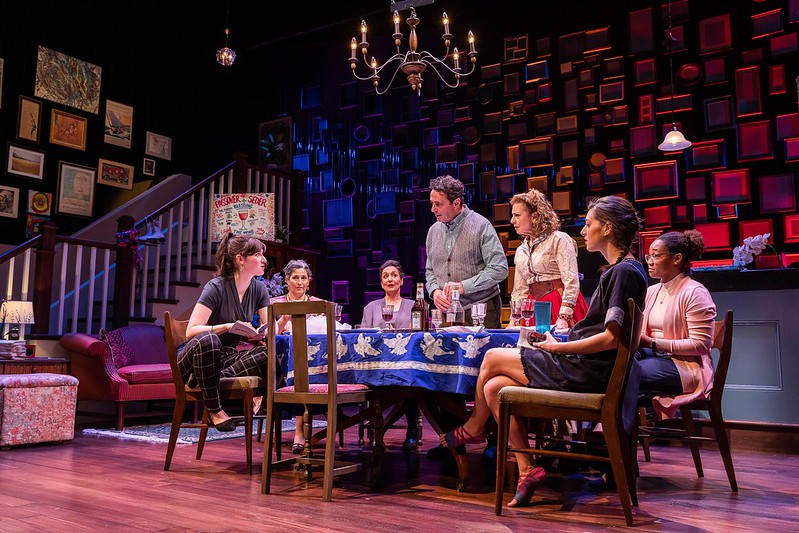Presented by Huntington Theatre Company
by Lila Rose Kaplan
Directed by Melia Bensussen
Jan. 10 – Feb. 15, 2020
South End / Calderwood Pavilion at the BCA
Boston, MA
Huntington on Facebook
Critique by Kitty Drexel
“Ring-a-round the rosie,
A pocket full of posies,
Ashes! Ashes!
We all fall down.” – Traditional song (American version)
Boston, MA — We All Fall Down is a family portrait that examines clashing egos during a period of family dilemma. The Stein family isn’t talking to each other. In their defense, they aren’t listening either. It’s Passover. Everyone has an agenda and none of them correspond. We All Fall Down is about the power we give denial. The stronger the denial, the tauter the family bond.
Deep in the heart of Westchester County, New York, the Stein family is restless. Linda (Eleanor Reissa) and Saul (Stephen Schnetzer) are hosting their first Passover Seder in their lovely Westchester County home. They haven’t shown an interest in religious practice; this curious behavior is unusual for them. Daughters Sammi (Liba Vaynberg) and Ariel (Dana Stern) are dubious about their parents’ intentions and think they are up to something. Nan (Phyllis Kay) and Bev (Sarah Newhouse) watch until they can’t help but get involved in family politics. Linda’s personal assistant Ester (Elle Borders) is the only person who knows the Hebrew prayers. We All Fall Down is about the liberation of the mind and spirit.
We All Fall Down has scenes that occur in a bathroom. One of those scenes involves using a toilet for its intended purpose. Viewers with more sensitive palates should take this into consideration.
This play feels unfinished. Its comedic pacing is steady. Its characters leap off the stage. Yet, I perceived this production as a final draft and not a finished product.
The play’s multi-player stakes are revealed late. We’re introduced to the characters but not their drama. We learn about Linda’s newly published book, Saul’s previously published book, Sammi’s intersectional feminism and Ari’s eating disorder but none of this is why the audience is invited to the room. It’s all lengthy exposition.
We don’t know why the Steins are pointedly avoiding discussing matters of substance (such as why they are having a Seder in the first place when they aren’t religious). The Steins bicker from across the house, between two floors so they don’t have to get to a point. While its behavior that I recognize from my own family gatherings and its relatability makes it funny, these family squabbles take longer than half the play to lead to a point.
When the stakes are finally revealed, they’re stuffed down our throats one after the other, bam bam bam. This heaping tantrum of drama has only Bev’s whimsical quips to soften the edges. It’s too much, too quickly and the audience isn’t given enough time to properly digest the information we’re given.
The characters’ dysfunctional communication shouldn’t extend to the actors’ relationship with the audience. We want to care about the Steins but the play requires too much emotional labor from us. We can’t commit.

Cast of We All Fall Down Photo: Nile Hawver
We All Fall Down is funny. The cast has great comedic timing. Bensussen and her cast communicate to us strong characters making clear choices. We immediately know that they love each other: Ariel practices yoga in the living room and her family gives her enough space to do it. Linda keeps all of her daughters’ childhood mementos because she cherishes the girls who used them. Saul doesn’t understand his daughters but he talks to them about the things they find important. Their resulting squabbles are part of their dysfunctional love language.
Elle Borders, Sarah Newhouse, and Phyllis Kay add necessary flair to the production that it would otherwise be missing. Borders as Ester keeps the play morally on track. She’s steadfast and true to the family’s mission and the play’s potential. Newhouse and Kay are effortlessly hilarious. Seder novices and experts will identify with them.
One doesn’t have to know or understand the components of a traditional Passover seder to enjoy We All Fall Down but it helps. A remembrance of Fiddler on the Roof helps too. Both provide context into the unconventional behavior of the Stein family: Linda prepares the house while wearing an old costume from Sammi’s high school production of Fiddler (tailored by Saks, of course). She wiggles the ten plague-inspired finger puppets on both hands (one finger for each plague!); Ariel integrates a yoga break into the first ritual; Ester finds the lamb shank in the trash can. An interview by Director of New Works Charles Haugland with director Bensussen and playwright Kaplan better describes what a Seder is, is found in the programme.
I enjoyed We All Fall Down. I can see why the Huntington Theatre Company snapped it up for production. The characters are likable and their situation is relatable regardless of one’s religious upbringing or lack thereof.
